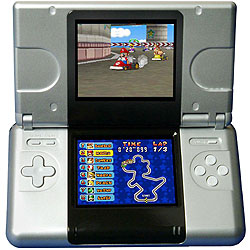Nintendo DS
Portable game machine with two screens, a touch-screen input, voice recognition, and wireless instant messaging
 As of 2004, for 15 years Nintendo's Game Boy line had been dominating the hand-held video game market. But on May 12 of that year, at the Electronics Entertainment Expo (E3), the new Nintendo DS creates a whole new category by radically altering the way people will play games. Nintendo DS remains on track to launch in Japan and North America before the end of the year, and in Europe the system would launch during the first quarter of 2005.
As of 2004, for 15 years Nintendo's Game Boy line had been dominating the hand-held video game market. But on May 12 of that year, at the Electronics Entertainment Expo (E3), the new Nintendo DS creates a whole new category by radically altering the way people will play games. Nintendo DS remains on track to launch in Japan and North America before the end of the year, and in Europe the system would launch during the first quarter of 2005.
With its two screens, Nintendo DS instantly shows its innovative face. But capabilities like a touch-screen input, voice recognition and wireless communication set it apart from every other game device, and again demonstrate Nintendo's passion for groundbreaking originality.
"When Nintendo came down and presented the DS platform to us, I think everyone was in shock," says Will Kassoy, Activision's vice president of global brand management. "It was amazing. Our technical guys were drooling at the abilities and wanting so much to dive into programming for the system."
Aptly code-named Nintendo DS, this "Developers' System" provides developers a newfound canvas not only to create new games today, but also shape the future of the entire industry. Developers -- and the public -- need only use their imagination to see how the DS promises to transform the portable game industry by changing the way gamers relate to their games -- and each other. Two screens offer two perspectives on the action at once. The touch screen could make accessing items, moving characters or navigating menus as easy as a tap or drag on the screen. Voice recognition could let players simply tell the game what they want it to do. Chat software will let users transmit text messages, handwriting and even drawings to one another. And wireless functions could link players in the same room -- or across the country.
"This has a huge potential," says Yoichi Haraguchi, Namco's vice president and executive officer. "It is very nice that we can create games using DS that were not even possible before."
Nintendo DS also will include two processors, 3-D capabilities on both screens, 16-channel sound and a rechargeable battery that features a low-energy-consumption design. One media bay handles new DS game cartridges that hold one gigabit of information and more. The second media port allows for compatibility with Game Boy Advance games, as well as a host of possible future accessories.
"While others plan to let you go a little faster down the same roads you have always traveled, Nintendo plans to take you down incredible avenues you've never seen before," explains Reggie Fils-Aime, Nintendo of America's executive vice president, sales and marketing. "We understand the hand-held market better than anyone else, and Nintendo DS paves a new path of originality and success."
Indeed, Nintendo invented and perfected the hand-held video game market with its unrivaled Game Boy line. And Nintendo has always been known for introducing innovations that radically reinvent the industry. It was the first company to install ports for four controllers, the first to create a rumble pack, the first to move from joysticks to modern controllers and the first to enable characters to roam freely in true 3-D environments. The unique features of the Nintendo DS build on that tradition and hold a wellspring of potential for the future. Game players will be wowed.
"Once again Nintendo is taking another leap by providing totally new game-play experiences," says Jay Cohen, Ubisoft's vice president of publishing. "Very characteristic of a Nintendo maneuver."
More than 100 companies worldwide have received software development kits and are planning games for Nintendo DS. Games in development by Nintendo include a new Super Mario game, a Metroid game, a WarioWare game and PictoChat, software that lets players send instant text and picture messages. Third-party publishers also have announced games in development, including a Spider-Man 2 title from Activision, a Rayman game from Ubisoft, a SpongeBob SquarePants title from THQ, a Yu-Gi-Oh! game from Konami, a Sonic title from Sega, a Bomberman game from Hudson Soft, a Need for Speed game from Electronic Arts and a Pac-Man title from Namco.
"THQ has been a strong supporter of Nintendo's hand-held systems over the years, and with great success," said Peter Dille, senior vice president of worldwide marketing, THQ. "We look forward to the many innovations they are planning for the DS."
THQ developed, published and distributed interactive entertainment software worldwide for a variety of platforms.
Nintendo manufactures and markets hardware and software for its popular home and portable video game systems.
